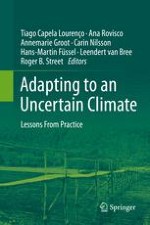2014 | OriginalPaper | Buchkapitel
3. How Is Uncertainty Addressed in the Knowledge Base for National Adaptation Planning?
verfasst von : Hans-Martin Füssel, Mikael Hildén
Erschienen in: Adapting to an Uncertain Climate
Aktivieren Sie unsere intelligente Suche, um passende Fachinhalte oder Patente zu finden.
Wählen Sie Textabschnitte aus um mit Künstlicher Intelligenz passenden Patente zu finden. powered by
Markieren Sie Textabschnitte, um KI-gestützt weitere passende Inhalte zu finden. powered by
